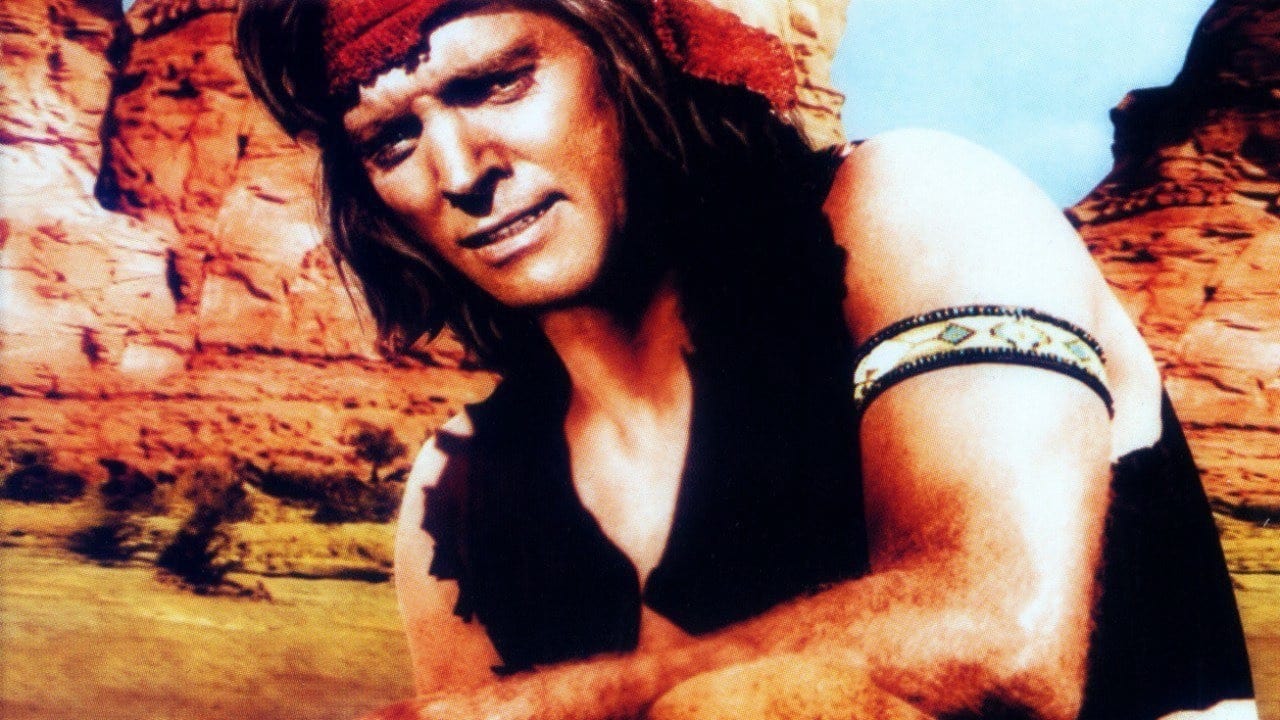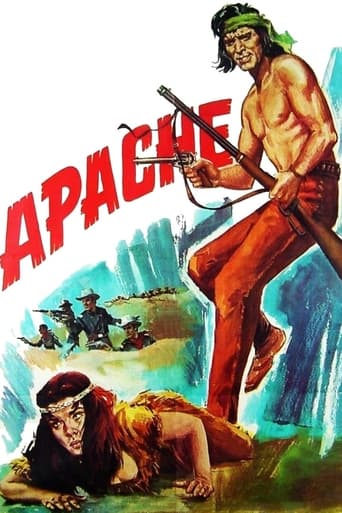

THIS PRODUCTION IS one of many contradictions. It tries hard to show us the view of history from the perspective of the American Indian. The tribe of choice here is obvious from the very title. They were also among the most ferocious fighters on the face of the earth.IN HERE LIES the problem for at appears that this production from Burt's own Hecht-Lancaster Productions/United Artists attempts to show it all, but sophomoric-ally tends to romanticize the situation.THERE IS NO denying that the various tribes that populated what is now the USA had suffered some great deal of high-handed, unfair and double dealing when it came to their status as citizens and even as being human. There were multiple cases of our Federal Government's habit of unilaterally violating treaties and other agreements made with the various Indian nations.WE HADN'T SEEN this film since its initial release in 1954. We caught it on cable and the handy-dandy DVR. Somehow it seemed less spectacular and more formula.THERE APPEARS TO be a tendency to romanticize the civilizations of those less technologically advanced as being some how more naturally virtuous. Hence we have the myth of "the Noble Savage." The operational, though false, premise being that the primitives are somehow closer to Nature and to God.THIS PRODUCTION STRIKES a sort of middle of the road approach between the tribal ways of life and the harsh treatment delivered by the Feds. It is our contention that the former is soft-soaped while the latter is at least somewhat exaggerated.AS FOR THE portrayal and characterization of the main character, Massai, it has its ups and downs.TO BEGIN WITH, his super stoic, anti-social and savagely brutal mindset appears to be contradicted by his intuitive rationale and sense of fair play. A definite duplicity and contradiction exists in the portrayal.ANOTHER AREA OF dramatizing that has some great variety to its part in the story is the wardrobe modeled by Mr. Lancaster as solo warrior, Massai. One ensemble is definitely on the right track and features some leather vest and long pants, topped off with the required wrap around kerchief tied around the head. Another puts us in mind of something that he would have purchased from Eddie Bauer's or Lands End.
... View MoreAldrich's first Technicolor picture, as well as the first star-driven one, sees him feeling towards future greatness, but stumbling along the way. "Apache", produced by Lancaster himself, never overcomes the terrible casting of the title character. Six foot tall, blue-eyed and Nordic looking, Lancaster is about the most unrealistic Indian ever, and the terrible wig they equipped him with does not help much either. Watching him and Jean Peters in their make up is almost akin to watching minstrels in black-face. Lancaster can show off his great physicality and athletic skill but to very little avail. The story is often clumsy and suffers from severe pacing problems and at times incongruous editing. Clearly, Aldrich and his collaborators were not ready yet for the bigger things to come in the future, but the jump in sophistication from this rather crude picture to "Vera Cruz" later in the same year is still rather astonishing. "Apache" is a very minor genre entry, perfectly watchable but without any lasting contribution to the Western, even given its unusually (certainly at the time) friendly portrayal of the American Indian. Aldrich and Lancaster would reunite and return to the themes presented here with much bigger success later in their careers for "Ulzana's Raid."
... View MoreThis film is just silly and not worth your time. One of the biggest reasons was the wretched decision to cast the 6' tall and blue-gray eyed Burt Lancaster as an American Indian!! Unfortunately, this silly miscasting was common in the 30s-50s, as the likes of Rock Hudson and Kent Smith also played Indians (among MANY others).Now if you can ignore the silly and racially insensitive casting, you still probably will hate the film because of the horrible writing. The story is supposedly about a real-life Indian ("Massai"), but the story bears little similarity to him. The biggest problem is that Massai is a hero in the film, but according to IMDb he was not just a murderer but a rapist--hardly the stuff of heroes!! Also, the film ends in the most ridiculous fashion. After Massai shoots at least two of his people, only minutes later, those trying to subdue him just let him walk away--yet he just killed two people!!!! Even if you are sympathetic to his cause, why not disarm him or at least give him a strong scolding for the killings!? If you can ignore the dumb casting, dumb mis-telling of Massai's life and dumb ending, can you enjoy the rest of the film? Well, no...you can't. That's because it purports to be a romance between Massai and Nalinle, it's about the least romantic pairing in film history! For his part, Massai treats Nalinle like dirt and she follows him like a whipped puppy. There is no love or chemistry. But to make it worse, I just wish the couple would have used a few pronouns!! Hearing Nalinle talking to Massai and referring to him as "Massai" (never YOU or even HE), it sounds like a kid in a school play trying to pretend (unconvincingly) that they are Indians. Dull and dumb--hardly a glowing endorsement!!
... View MoreBurt Lancaster is Massai, an Apache who does not want to surrender as Geronimo and be deported to Florida. Jean Peters is his girlfriend, and Charles Bronson is Hondo, who has accepted life under the reservation. Lancaster is aiming to die as an hero to be an example to his tribe, but he has conflicting thoughts because he is also toying with the idea of planting corn, suggested by a Cherokee. Robert Aldrich was forced to accept a happy ending that was not originally intended. According to him, this distorted completely the meaning of the film which was built around the idea of Massai dying to maintain his dignity. Aldrich later on made Ulzana's Raid, also with Lancaster, with the same type of story, but doing it the way he wanted to.
... View More